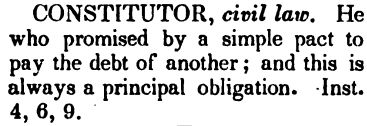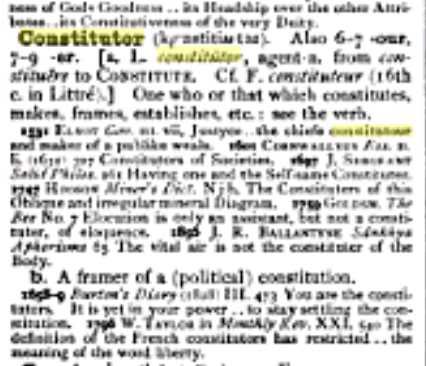Real0ne
Posts: 21189
Joined: 10/25/2004
Status: offline

|
quote:
ORIGINAL: Kirata
quote:
ORIGINAL: Real0ne
I would like to hear on what grounds people think they are or are not qualified to make all these moral decisions when moral decisions are religious?
From whence comes this assumption that "moral decisions are religious"? There are a number of things, murder, theft and dishonesty figuring prominently among them, that are considered unacceptable in virtually all human societies, and for the suppression of which a sufficient defense exists independent of religious or statutory law because, simply put, nobody wants to become a victim of murder, theft or dishonesty. Such universal human sentiments constitute a lex naturalis over which neither the state nor religion should hold sway.
K.
I posted a couple snippets from the philosopher emmanuel kant to sort of lay a bit of groundwork to illustrate how a few of the distinctions are laid out and how the conclusions are derived.
It starts out with moral theory and acting in a moral manner which kant ties in with reason.
quote:
5. Moral Theory
Kant’s moral theory is organized around the idea that to act morally and to act in accordance with reason are one and the same. In virtue of being a rational agent (that is, in virtue of possessing practical reason, reason which is interested and goal-directed), one is obligated to follow the moral law that practical reason prescribes.
He argues that it “would be a crime against human nature” (8:39) to legislate religious doctrine because doing so would be to deny to humans the very free use of reason that makes them human. Similarly, restrictions on what Kant calls the “public use of one’s reason” are contrary to the most basic teleology of the human species, namely, the development of reason. Kant himself had felt the sting of an infringement on these rights when the government of Friedrich Wilhelm II (the successor to Frederick the Great) prohibited Kant from publishing anything further on matters pertaining to religion. http://www.iep.utm.edu/kantview/#H5
I am not sure what you are arguing since as far back in time as I have seen philosophy has always considered the exercise of religion the resulting actions of 'conscience' based on right and wrong.
Have you commingled politics with religion under one umbrella?
Natural Law (redirected from Lex naturalis)
Also found in: Dictionary/thesaurus, Medical, Financial, Encyclopedia, Wikipedia.
Natural Law
The unwritten body of universal moral principles that underlie the ethical and legal norms by which human conduct is sometimes evaluated and governed. Natural law is often contrasted with positive law, which consists of the written rules and regulations enacted by government. The term natural law is derived from the Roman term jus naturale. Adherents to natural law philosophy are known as naturalists.
Naturalists believe that natural law principles are an inherent part of nature and exist regardless of whether government recognizes or enforces them. Naturalists further believe that governments must incorporate natural law principles into their legal systems before justice can be achieved. There are three schools of natural law theory: divine natural law, secular natural law, and historical natural law.
Divine natural law represents the system of principles believed to have been revealed or inspired by God or some other supreme and supernatural being. These divine principles are typically reflected by authoritative religious writings such as Scripture. Secular natural law represents the system of principles derived from the physical, biological, and behavioral laws of nature as perceived by the human intellect and elaborated through reason. Historical natural law represents the system of principles that has evolved over time through the slow accretion of custom, tradition, and experience. Each school of natural law influenced the Founding Fathers during the nascent years of U.S. law in the eighteenth century and continue to influence the decision-making process of state and federal courts today.
Divine Natural Law
Proponents of divine natural law contend that law must be made to conform to the commands they believe were laid down or inspired by God, or some other deity, who governs according to principles of compassion, truth, and justice. These naturalists assert that the legitimacy of any enacted human law must be measured by its consonance with divine principles of right and wrong. Such principles can be found in various Scriptures, church doctrine, papal decrees, and the decisions of ecclesiastical courts and councils. Human laws that are inconsistent with divine principles of morality, naturalists maintain, are invalid and should neither be enforced nor obeyed. St. Thomas Aquinas, a theologian and philosopher from the thirteenth century, was a leading exponent of divine natural law.
According to Judeo-Christian belief and the Old Testament, the Ten Commandments, were delivered to Moses by God on Mount Sinai. These ten laws represent one example of divine natural law. The Bible and Torah are thought by many to be other sources of divine natural law because their authors are said to have been inspired by a divine spirit. Some Christians point to the Canon Law of the Catholic Church, which was applied by the ecclesiastical courts of Europe during the Middle Ages, as another source of divine natural law.
Before the Protestant Reformation of the sixteenth century, Europe was divided into two competing jurisdictions—secular and religious. The emperors, kings, and queens of Europe governed the secular jurisdiction, and the pope presided over the religious jurisdiction. The idea that monarchs ruled by "divine right" allowed the secular jurisdiction to acquire some of the authority of religious jurisdiction. Moreover, the notion that a "higher law" transcends the rules enacted by human institutions and that government is bound by this law, also known as the Rule of Law, fermented during the struggle between the secular and religious powers in Europe before the American Revolution. For example, Henry de Bracton, an English judge and scholar from the thirteenth century, wrote that a court's allegiance to the law and to God is above its allegiance to any ruler or lawmaker.
The influence of divine natural law pervaded the colonial period of U.S. law. In 1690 English philosopher John Locke wrote that all people are born with the inherent rights to life, liberty, and estate. These rights are not unlimited, Locke said, and may only be appropriated according to the fair share earned by the labor of each person. Gluttony and waste of individual liberty are not permitted, Locke argued, because "[n]othing is made by God for man to spoil or destroy."
In the Declaration of Independence, Thomas Jefferson, borrowing from Locke, wrote that "all men are created equal … and are endowed by their creator with certain inalienable rights … [including] life, liberty and the pursuit of happiness." Jefferson identified the freedom of thought as one of the inalienable rights when he said, "Almighty God has created the mind free, and manifested his supreme will that free it shall remain by making it altogether insusceptible of restraint." In Powell v. Pennsylvania, 127 U.S. 678, 8 S. Ct. 1257, 32 L. Ed. 253 (1888), the Supreme Court recognized the importance of the divine influence in early U.S. law, stating that the "right to pursue happiness is placed by the Declaration of Independence among the inalienable rights of man, not by the grace of emperors or kings, or by the force of legislative or constitutional enactments, but by the Creator."
The U.S. Constitution altered the relationship between law and religion. Article VI establishes the Constitution as the supreme law of the land. The First Amendment prohibits the government from establishing a religion, which means that a law may not advance one religion at the expense of another or prefer a general belief in religion to irreligion, atheism, or agnosticism. Although the Supremacy and Establishment Clauses seemingly preclude the judiciary from grounding a decision on Scripture or religious doctrine, state and federal courts have occasionally referred to various sources of divine natural law.
For example, in Edwards v. Aguillard, 482 U.S. 578, 107 S. Ct. 2573, 96 L. Ed. 2d 510 (1987), the Supreme Court said that "the Founding Fathers believed devotedly that there was a God and that the inalienable rights of man were rooted in Him." In McIlvaine v. Coxe's Lessee, 6 U.S. 280, 2 Cranch 280, 2 L. Ed. 279 (1805), the Supreme Court relied on the Bible as "ancient and venerable" proof that expatriation had long been "practiced, approved, and never restrained."
that said I dont understand the question?
quote:
ORIGINAL: Kirata
From whence comes this assumption that "moral decisions are religious"?
K.
Care to be more specific or have I overlooked some subtle point you are trying to make?
< Message edited by Real0ne -- 8/15/2015 6:39:24 AM >
_____________________________
"We the Borg" of the us imperialists....resistance is futile
Democracy; The 'People' voted on 'which' amendment?
Yesterdays tinfoil is today's reality!
"No man's life, liberty, or property is safe while the legislature is in session
|

 Profile
Profile





 New Messages
New Messages No New Messages
No New Messages Hot Topic w/ New Messages
Hot Topic w/ New Messages Hot Topic w/o New Messages
Hot Topic w/o New Messages Locked w/ New Messages
Locked w/ New Messages Locked w/o New Messages
Locked w/o New Messages Post New Thread
Post New Thread